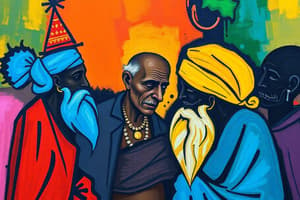Podcast
Questions and Answers
Which author contributed to an understanding of Indian civilization through their work from the Indian Institute of Advanced Study?
Which author contributed to an understanding of Indian civilization through their work from the Indian Institute of Advanced Study?
- S.C.Malik (correct)
- S.Cohen
- Gautam A
- M.Singh
What is the primary subject matter of the 'National Environmental Policy-2006' published by the Ministry of Environment and Forests?
What is the primary subject matter of the 'National Environmental Policy-2006' published by the Ministry of Environment and Forests?
- Economic Development
- Educational Reforms
- Disaster Management
- Environmental Protection (correct)
Which publication addresses the theme of federalism in the context of global dialogue?
Which publication addresses the theme of federalism in the context of global dialogue?
- 'Explaining Indian Institutions'
- 'Indian Politics: Constitutional Foundations and Institutional Functioning'
- 'A Global Dialogue on Federalism' (correct)
- 'The Making and Working of the Indian Constitution'
What is a common theme among the works authored by Dhingra, Dutt, and Sundharam?
What is a common theme among the works authored by Dhingra, Dutt, and Sundharam?
Which author focused on natural hazard mitigation and its implications for disaster policy?
Which author focused on natural hazard mitigation and its implications for disaster policy?
What type of institution is highlighted in the work of L.Rudolph and S.Rudolph concerning Indian societal analysis?
What type of institution is highlighted in the work of L.Rudolph and S.Rudolph concerning Indian societal analysis?
What type of document is the Economic Survey published by the Government of India?
What type of document is the Economic Survey published by the Government of India?
Which publication by MoEF is repeated in the list, indicating its significance in environmental policy?
Which publication by MoEF is repeated in the list, indicating its significance in environmental policy?
What does the concept of Bharatavarsha primarily emphasize?
What does the concept of Bharatavarsha primarily emphasize?
Which Indian mathematician is known for contributions in Astronomy?
Which Indian mathematician is known for contributions in Astronomy?
Which socio-religious reform movement was founded by a prominent figure who also played a significant role in modern education?
Which socio-religious reform movement was founded by a prominent figure who also played a significant role in modern education?
What was a key legacy of the Indian National Movement?
What was a key legacy of the Indian National Movement?
Who among the following is NOT typically associated with the Indian National Congress?
Who among the following is NOT typically associated with the Indian National Congress?
Which of the following contributions is linked to Sushruta?
Which of the following contributions is linked to Sushruta?
The Revolt of 1857 is also known for its role in the struggle against which governing body?
The Revolt of 1857 is also known for its role in the struggle against which governing body?
Which feature is NOT considered a salient aspect of the Indian Constitution?
Which feature is NOT considered a salient aspect of the Indian Constitution?
Study Notes
Learning Objectives
- Appreciate pluralism and unity in diversity within Indian society.
- Highlight India's contributions across various fields of knowledge.
- Understand contributions of various societal sections to the Indian freedom struggle.
- Inculcate values promoted by the Indian National Movement.
Unit I: Foundations of Indian Culture and Knowledge
- Bharatavarsha: Explore the concept's origin and evolution as a historical and cultural identity.
- Unity in Diversity: Understand the idea of a composite culture shaped by multiple influences.
- Indian Education Systems: Examine traditional education methods (Vedic, Buddhist, Muslim) and the emergence of modern education.
- Contributions to Medicine and Science:
- Medicine: Key figures include Charaka and Sushruta.
- Mathematics and Astronomy: Influential scholars such as Aryabhatta, Varahmihira, and Ramanuja.
- Philosophy Contributions: Study the Sad Darshan as a significant philosophical tradition.
- Socio-Religious Reform Movements: Understand the impacts of movements like Brahmo Samaj, Arya Samaj, and the Aligarh Movement.
Unit II: The Indian Freedom Struggle
- Revolt of 1857: Recognized as a pivotal event in India's fight for independence.
- Foundation and Role of Indian National Congress: Established as a major platform for political activism against colonial rule.
- Makers of Modern India: Notable figures include:
- Raja Ram Mohan Roy: Forefather of social reforms.
- Rabindranath Tagore: Poet and advocate for nationalism.
- Sir Syed Ahmad Khan: Promoted modern education among Muslims.
- Dada Bhai Naoroji: First Indian to address the British Parliament.
- M.K. Gandhi: Leader of the non-violent struggle for independence.
- J.L. Nehru: Key figure in nation-building and India's first Prime Minister.
- V.B. Patel: Architect of the Indian union.
- Abul Kalam Azad: Educationist and freedom fighter.
- B.R. Ambedkar: Principal architect of the Indian Constitution.
- Contributions of Diverse Groups: Recognition of roles played by peasants, tribal communities, the working class, and women in the freedom movement.
- Legacy of the Indian National Movement: Enduring principles include secularism, socialism, and democracy.
- Indian Constitution: Discuss key features and importance in establishing democratic governance in India.
Studying That Suits You
Use AI to generate personalized quizzes and flashcards to suit your learning preferences.
Related Documents
Description
This quiz evaluates your understanding of pluralism and the contributions of India to various branches of knowledge. It encourages appreciation of unity in diversity and highlights the importance of different cultural contributions. Perfect for students enrolled in the UIN223V course.




